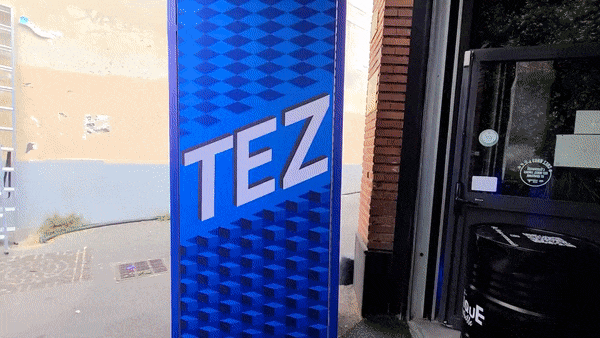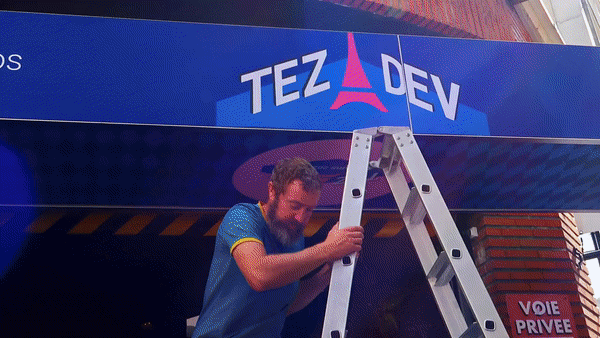- The Baking Sheet
- Posts
- The Baking Sheet - Issue #161
The Baking Sheet - Issue #161
Tez/Dev 2023 Highlights: Tezos' Evolution, Community Spirit, and Future Growth
#RiseofRollups on Tezos

Tez/Dev 2023: A Chronicle of Tezos' Evolution and Community Spirit

Paris, the city of lights, was illuminated with a different kind of brilliance on July 21st, 2023. It was the day when Tez/Dev 2023, the premier Tezos conference of the year, unfolded, drawing in a diverse crowd of blockchain enthusiasts, developers, and visionaries from across the globe.
As we stepped into the conference hall, the palpable energy of anticipation and excitement was hard to miss.

The day began with a presentation by Hadrien Zerah from Nomadic Labs, a mathematician maestro. Hadrien’s insights on securing and enhancing the value of projects on Tezos were not just informative but also served as a roadmap for those looking to navigate the Tezos landscape.

Arthur Breitman, co-founder of Tezos, took the stage to discuss the future of Tezos. His revelation about the next era of rollups, including Ultra-High Throughput (UHT), was a testament to the relentless innovation happening within the Tezos ecosystem. The community's priorities were not just acknowledged but also addressed with a commitment to performance, composability, decentralization, interoperability, and an optimal developer experience.

The workshops were a microcosm of the larger Tezos ecosystem, with organizations like Mailchain, Nomadic Labs, StakeNow, Trilitech, and Flashbake offering a deep dive into various aspects of Tezos. The project showcase was a testament to the innovative spirit of the Tezos community, with Kord Finance, Youves, MadFish, Billy, Plenty Network, and Tezos Baking Bad sharing their amazing projects on Tezos.
A demonstration by development wizards, Emma Turner and Thomas Letan, showcasing how 1M TPS is achieved, was nothing short of a game-changer. Following up, The web3 game showcase, featuring Team Vitality, Eleet Games, Blockborn, Playstables, Trivia Cash, and SlimeDash.io, was a glimpse into the future of gaming on blockchain platforms.

The exploration of Tezos' future continued with Andrea Cerone and Saroupille from Trilitech and Nomadic Labs delving into Data Availability solutions, including the Data Availability Committee (DAC), and Data Availability Layer (DAL).

Tim Boeckmann, CEO of Mailchain, led a workshop that was a masterclass in communicating with users in Web3, teaching attendees how to engage users privately, securely, and intuitively.
Jean Schmitt's insights into how Ubisoft's Strategic Innovation Lab utilized Tezos smart rollups and smart contracts to enhance HashCraft, its first blockchain prototype, was a fascinating usecase of blockchain's potential in gaming.

The DeFi Panel and the Panel Discussion on the state of L2s in 2023 were insightful explorations into the blockchain landscape.

Valentin and Pierrick from Labos Nomades shared insights into EVM rollups and smart rollups on Tezos, showcasing the decentralized, cost-efficient, and robust L2 solution compatible with the Ethereum ecosystem.

The day concluded with a fireside chat between Marco and Alessandro De Carli, exploring universal interoperability and the potential for unlocking seamless cross-platform communication.

Tez/Dev 2023 was a testament to the incredible enthusiasm and support within the Tezos community. The event showcased brilliant innovations and highlighted the dynamic energy within the community. The shared experiences and discussions from the event will undoubtedly fuel the continued growth and innovation in the Tezos ecosystem. As we look forward to more exciting events on the horizon, the passion and efforts in building on Tezos remain the engine that drives the blockchain’s success.

PS — All the recordings of Tez/Dev 2023 will be available on Tezos YouTube
This Week in the Tezos Ecosystem

Messari Tezos Q2 2023 Report: Rollup Infrastructure and Network Upgrades Drive Growth
1 Big Thing: Tezos' Q2 2023 report, released by Messari, highlights significant progress in its rollup infrastructure roadmap and the successful launch of its fourteenth network upgrade, Nairobi.
Why it matters: The advancements in Tezos' rollup infrastructure and the introduction of the Data Availability Layer (DAL) are key to the network's scalability and future growth.
Driving the news:
Tezos is making significant progress in its rollup infrastructure roadmap, with the introduction of WASM rollups and an EVM-compatible rollup on testnet. Multiple teams have committed to building rollups, and core developers announced a strategic shift to hybrid optimistic/zk rollups.
The 14th network upgrade, Nairobi, is now live, offering notable improvements such as increased TPS, new rollup functionality, and enhanced attestations.
Tezos core developers unveiled the Data Availability Layer (DAL), which will operate in parallel with Tezos Layer-1. Leveraging Tezos validators, the DAL ensures data availability while scaling bandwidth and storage capacity.
DeFi is experiencing growing traction on Tezos, with the TVL nearly doubling in the past year. Several new DeFi protocols are nearing launch including novel DEXs, lending protocols, and perps protocols.
Tezos introduced the Tezos Ecosystem DAO, aimed at managing and distributing XTZ to support community initiatives. This DAO fosters community participation and contributes to the growth of the Tezos ecosystem.
The big picture: Despite a 30% quarter-on-quarter drop in market capitalization in Q2 2023, Tezos has demonstrated resilience and growth, particularly in the DeFi sector, with total value locked (TVL) nearly doubling in the past year.
What's next: With the DAL expected to be activated through a protocol upgrade in early 2024 and the continued development of rollup infrastructure, Tezos is poised for further growth and adoption.
Go deeper: For a more comprehensive understanding of Tezos' Q2 2023 progress, including detailed insights into its financial overview, network usage, development, protocol upgrades, ecosystem overview, and future plans, refer to the full report by Messari.

Continuity Flaws: The Loophole" - A New Digital Art Exhibition by Gabriel Massan
1 Big Thing: A new digital art exhibition, "Continuity Flaws: The Loophole," by Gabriel Massan is set to open at Outernet London, offering visitors a unique perspective on life in today's global society.
Why it matters: The exhibition, presented by Outernet Arts and Serpentine UK Arts Technologies, explores the precarious conditions of life in today's global society through stunning visuals and interactive digital artwork.
Driving the news:
"Continuity Flaws: The Loophole" is an extension of "Third World: The Bottom Dimension," a project by Gabriel Massan and collaborators. The project features a video game and tokens powered by the Tezos blockchain.
Visitors can dive into the video game for free, offering an immersive experience that complements the physical exhibition. The game can be accessed online here.
The exhibition will be hosted at Outernet London, with free entry every Sunday from July 30 through to September 17.
The big picture: This collaboration between Gabriel Massan, Outernet Arts, and Serpentine UK Arts Technologies is a testament to the growing intersection of digital art, gaming, and blockchain technology.
What's next: The exhibition will be held at The Now Building at Outernet London. For those interested in experiencing this unique blend of digital art and gaming, mark your calendars for a Sunday visit.
Go deeper: For more information about the exhibition and to access the video game, click here.
This Week in Tezos Development

DipDup Unveils Major Update: What You Need to Know
The Baking Bad team has announced a significant update to the DipDup indexing stack, marking a new era for the product with a complete rebranding and the achievement of several major milestones.
The update brings a host of new features and improvements, including support for EVM-compatible blockchains, an updated Python 3.11 environment, improved Docker images, enhanced indexing performance, and storage layer improvements. These changes are set to offer an even better experience for developers and users alike.
Key details:
DipDup Verticals: The much-anticipated DipDup Verticals are now live, offering users access to a wide range of data including market data, dapp statistics, chain analytics, and NFT metadata. The platform also provides a powerful search function and an indexed mempool. All these features are accessible through a convenient GraphQL API endpoint, available for both mainnet and ghostnet. Access DipDup Verticals here.
DipDup Playground: The DipDup Playground has been transformed into a fully-fledged GraphQL IDE, offering an impressive feature set that is set to be extended further. The new IDE promises a great developer experience with its visually appealing interface. Try out the DipDup Playground here.
DipDup Framework: The DipDup Framework has received a significant update, version 7.0rc1. This update brings substantial performance improvements, simplifies maintenance and onboarding, and introduces reworked documentation. Notably, the update also includes support for EVM rollups, a feature that has been eagerly awaited by the developer community.
EVM Support: DipDup now supports EVM-compatible blockchains in addition to Tezos. This new index allows developers to process contract events from Ethereum, Binance Smart Chain, Polygon, and other EVM-compatible networks. DipDup fetches historical data from Subsquid Archives, real-time data from RPC nodes, and ABIs from Etherscan.
Developer Experience: The interactive installer has been updated for better compatibility with pyenv and other Python tooling. The command for creating new projects has also been updated and now includes EVM templates. Package and config discovery have been improved, making project management easier.
Environment and Performance: DipDup projects now run on Python 3.11, which introduces significant performance improvements. DipDup also better pre-fetches and caches data during indexing to increase processing speed. Docker images are now based on Debian 12, offering simplicity, security, and easy extension.
DipDup ORM: The storage layer based on Tortoise ORM, referred to as DipDup ORM, has been improved. The 7.0 release brings enhanced query performance, better schema uniformity between database engines, and new field types.
Project Package: The project package structure has been significantly updated and is now easier to extend. All sections are created on init and pre-filled with stubs. The DipDup package now includes three new sections: models, configs, and deploy.
What's next
Developers are encouraged to migrate their projects to the new 7.0 version. The Baking Bad team has provided a detailed guide to assist developers in the migration process, ensuring a smooth transition to the updated platform.
The bottom line
The DipDup indexing stack's major update and rebranding mark a significant step forward for the product. With the introduction of new features and improvements, DipDup is set to offer an even better experience for developers and users alike.
For more information about the update and to access the new features, click here.
Now Streaming

TezTalks LIVE with Nicolas Ochem of MIDL.Dev
We're going to dive deep into Nicolas's awesome work in creating the Tezos testnet called Ghostnet, and explore cool stuff like layer-2 scaling applications, including EVM rollups.